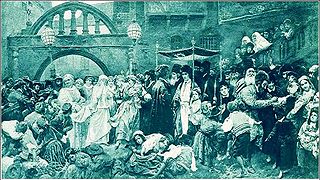
The Jewish view on marriage, historically, provided Biblically mandated rights to the wife which were accepted by the husband. A marriage was ended either because of a divorce document given by the man to his wife, or by the death of either party. Certain details, primarily as protections for the wife, were added in Talmudic times.

An engagement, betrothal, or fiancer is the relationship between two people who want to get married, and also the period of time between a marriage proposal and a marriage. During this period, a couple is said to be betrothed,intended, affianced, engaged to be married, or simply engaged. Future brides and grooms may be called the betrothed, a wife-to-be or husband-to-be, fiancée or fiancé, respectively. The duration of the courtship varies vastly, and is largely dependent on cultural norms or upon the agreement of the parties involved.

A chuppah, also huppah, chipe, chupah, or chuppa, is a canopy under which a Jewish couple stand during their wedding ceremony. It consists of a cloth or sheet, sometimes a tallit, stretched or supported over four poles, or sometimes manually held up by attendants to the ceremony. A chuppah symbolizes the home that the couple will build together.
Rabbi Yishmael ben Elisha, often known as Rabbi Yishmael and sometimes given the title "Ba'al HaBaraita", was a rabbi of the 1st and 2nd centuries.
Ulla or 'Ulla was a Jewish Talmudist and one of the leading Halakhic amoraim in the Land of Israel during the late 3rd and early 4th centuries CE.

A Jewish wedding is a wedding ceremony that follows Jewish laws and traditions.
Rav Sama bar Raqta was a Babylonian Rabbi, of the sixth generation of amoraim.
Joseph Trani (1538–1639) or Joseph di Trani was a Talmudist of the latter part of the 16th century who lived in Greece. By contemporary scholars he was called Mahrimat, and regarded as one of the foremost Talmudists of his time. Today he is more widely known as Maharit. He is the son of the Mabit.

Levi ben Sisi or Levi bar Sisi was a Jewish scholar, one of the semi-tannaim of the late 2nd century and early 3rd century.
Shela was a Babylonian teacher of the latter part of the tannaitic and the beginning of the amoraic period, and head of the school ("sidra") at Nehardea. When Rav visited Babylonia, he once officiated as an expounder (amora) for R. Shela at his public lectures. The school at Nehardea was named in honor of Shela; and its scholars were accordingly known as "D'Bei R. Shela."
Rabbi Yannai was an amora who lived in the 3rd century, and of the first generation of the Amoraim of the Land of Israel.
Rav Yosef bar Hiyya, or simply Rav Yosef, was a Babylonian rabbi of the third generation of amoraim.
Amemar was a Babylonian rabbi, of the fifth and sixth generation of amoraim.
For another Jewish Amora sage also of the Land of Israel, same 3d Amoraic generation and with a similar name, see Hanina ben Pappa.
For the Babylonian Amora sages of the 5th generation, see Rav Papi or Rav Papa.
Rabbi Abba bar Memel, or Abba mar Memel, was an rabbi of the Land of Israel of the second and third generation of amoraim.
Rabbi Hilkiah was an Amora of the Land of Israel of the fourth generation of the Amoraic era. He was an Aggadist and his teachings mostly dealt with this issue.
Rav Anan was a Babylonian rabbi of the third century.
Rabin or Ravin, short for Rabbi Abin and also known in the Yerushalmi as Rabbi Abon or Rabbi Bon, was a rabbi from the fourth generation of amoraim in the Land of Israel.
This page is based on this
Wikipedia article Text is available under the
CC BY-SA 4.0 license; additional terms may apply.
Images, videos and audio are available under their respective licenses.




